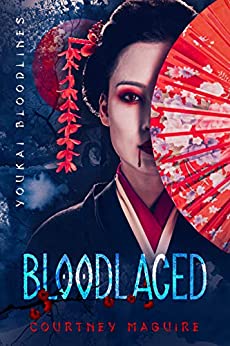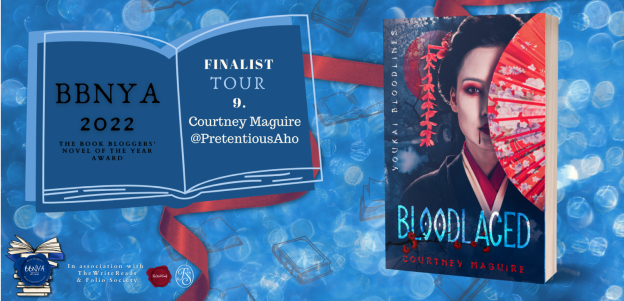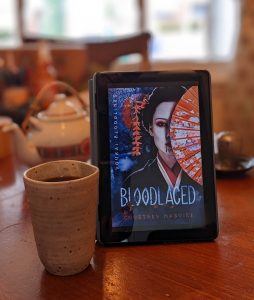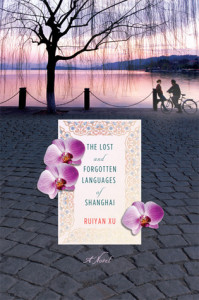Blood Bound, book three of Courtney Maguire‘s Youkai Bloodlines, was over on Sadie‘s Spotlight earlier in the year. So, when I stumbled across a copy of book one Bloodlaced—which was later on Sadie’s Spotlight as a BBNYA finalist—I opted to start the series.

Kanjin hardly view their servants as human. Even less so when they are different.
Asagi is different. Both a man and a woman.
In the wake of his failure to protect a boy he saw as a son from their abusive master, Asagi is sold into the house of a young nobleman, Mahiro, who is the opposite of everything Asagi has ever known—gentle, kind, and generous.
Mahiro bonds with Asagi and their friendship blooms into a deep and profound love. But when Asagi is poisoned out of jealousy, Mahiro reveals himself to be youkai, a demon who feeds on blood, and he has no choice but to turn Asagi to save his life.
Asagi awakes reborn, strong, and eternally youthful. But the price for Asagi’s new life is high.
The blood of the innocent.
Just as Asagi’s trust in Mahiro falters, the boy he failed to protect, now a man, reappears.
New master, same threat.
With both a literal and proverbial monster at the door, Asagi must decide what it means to be human to protect what he loves most.

Oh man, this book was a rollercoaster for me. I took one look at the cover and the fact that it’s about vampires in ancient Japan (to use a western for them) and thought, “I am in!” I expected to love it. Then, I hated the first 25%. It’s basically trauma porn. Granted, the abuse is off-page, but it’s very clear what is happening, and the main character martyred themself more than once. So, I thought, “Oh, this isn’t for me, after all.”
Then, things balanced out, and I got a little bored. Then, at the 50% mark, the plot shifted, and I was interested again. Then, the romance (and the whole plot, really) went off in a direction I didn’t expect, and I was uncertain but invested. And THEN, I cried at the end before being given a little ray of hope on the last page. Rollercoaster of emotion!
As I said, I’m not into victimized hero(ine) plotlines. I’m not saying it’s bad in any objective way; I just don’t enjoy reading it. I did get a bit bored in the middle; the pacing is a bit off. And I have to admit that I’ve never really understood why, when a book is supposed to be happening somewhere that speaks another language (Japanese in this case), authors sometimes still throw the occasional that-language word into the English narrative, usually as expletives. It always stands out to me, breaking the flow. But overall, I will be looking forward to continuing the series.
Other Reviews:
Review: Bloodlaced (Youkai Bloodlines #1) by Courtney Maguire
Book Review: Bloodlaced (Youkai Bloodlines Book 1) by Courtney Maguire


